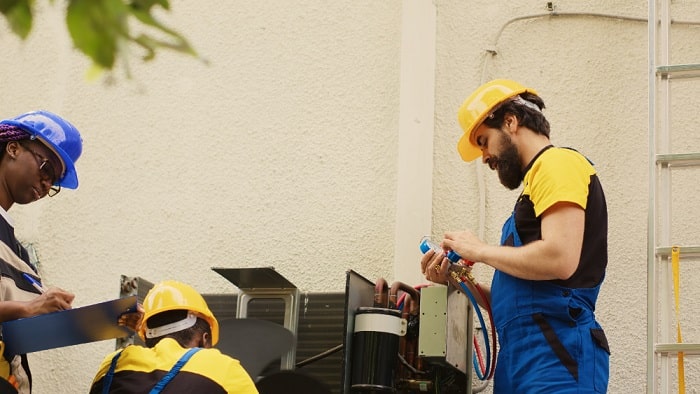Outdoor electrical installations and repairs require specific knowledge and skills due to the unique challenges posed by exposure to the elements and the higher potential for electrical hazards. While many electrical tasks can be handled indoors with relative ease, working outside demands a greater awareness of safety standards, weather conditions, and the type of equipment used. Licensed electricians at Summit Electrical Solutions are trained to address these challenges, ensuring the work is done safely and complies with local codes. We will explore how licensed electricians handle outdoor electrical installations and repairs, from safety precautions to equipment selection and troubleshooting.
Understanding the Challenges of Outdoor Electrical Work
Outdoor electrical installations and repairs present numerous challenges distinguishing them from indoor tasks. Exposure to various environmental conditions, such as rain, wind, and fluctuating temperatures, can complicate installation and increase the risk of electrical malfunctions. For instance, outdoor wiring and components must be waterproof, weather-resistant, and insulated properly to prevent moisture from causing short circuits or other electrical hazards. Additionally, working outdoors often involves longer cable runs, ground installation, and outdoor lighting systems, all requiring specific considerations to ensure functionality and safety. Licensed electricians are trained to assess these factors before beginning any project. They carefully evaluate the location for potential hazards like standing water, trees, and other obstacles that might interfere with the installation or repair. By considering these factors, they ensure that the electrical work will be reliable, safe, and long-lasting.
Safety Protocols for Outdoor Electrical Work
Safety is a top priority in outdoor electrical installations and repairs. Licensed electricians follow strict safety protocols to minimize the risk of electrical shock or fire, both for themselves and anyone nearby. One of the first steps in any outdoor electrical job is to turn off the power supply to the area. This prevents accidental electrocution or injury while working with wiring, outlets, and fixtures. Electricians also use insulated tools and wear rubber gloves and boots designed to protect against electrical hazards.
Additionally, electricians ensure that all wiring is properly grounded to prevent electrical surges from damaging the system or causing fires. In many cases, outdoor electrical systems are connected to larger power grids, so electricians must follow safety measures when working with high-voltage equipment. Furthermore, licensed electricians are well-versed in adhering to local electrical codes, which specify the requirements for outdoor electrical installations to prevent unsafe conditions that could lead to electrical fires or accidents.
Selecting the Right Equipment for Outdoor Use
The success of any outdoor electrical installation or repair depends largely on the selection of appropriate equipment. Since outdoor electrical systems are exposed to the elements, electricians must choose materials and components that are durable and suitable for external conditions. For example, outdoor outlets and light fixtures must be rated for wet locations. Weatherproof covers are often used to protect outlets from rain and debris. Cables and wiring must also be rated for outdoor use, with insulation designed to withstand exposure to UV rays, temperature fluctuations, and moisture. Licensed electricians thoroughly understand the various types of outdoor-rated electrical equipment and know which ones are suitable for specific applications. Whether installing outdoor lighting, power outlets, or landscape irrigation systems, electricians will select equipment that meets the necessary safety and durability standards. They ensure that every component used is appropriate for its intended purpose, which helps extend the installation’s life and minimizes the need for future repairs.
Dealing with Complex Outdoor Wiring Systems
One of the more complicated aspects of outdoor electrical work is dealing with complex wiring systems that span large areas. Many outdoor electrical installations, such as landscape lighting, kitchens, and garden irrigation systems, require extensive wiring to connect the various components. The task becomes even more challenging when wiring needs to be buried underground or installed along fences and buildings. Licensed electricians are skilled in planning and executing these complex wiring tasks, ensuring that the wiring is properly routed and secured to prevent damage. They also use the right types of wire that can withstand outdoor conditions, such as direct burial wire for underground installations. Proper wire connections and insulation are crucial in preventing electrical malfunctions, so electricians follow wiring standards and codes. In addition, they ensure that the wiring is installed at appropriate depths and locations to avoid accidental damage from landscaping equipment, digging, or other outdoor activities.
Maintaining Outdoor Electrical Systems
Once outdoor electrical systems are installed, regular maintenance is essential to ensure they continue to function properly. Over time, outdoor wiring can become exposed to weathering, corrosion, and physical wear and tear. Licensed electricians are trained to inspect these systems periodically to check for issues like fraying wires, loose connections, or water damage. For example, outdoor outlets should be checked for proper grounding, and any weatherproof covers should be inspected to ensure they are not cracked or damaged. Light fixtures, including floodlights, security lighting, and garden lights, may need occasional cleaning to prevent dirt and debris from obstructing the lights or interfering with their performance. Electricians also check for signs of electrical overload or short circuits that might pose a safety risk. By performing regular maintenance, electricians can help homeowners avoid costly repairs and ensure that their outdoor electrical systems remain functional and safe for many years.
Outdoor electrical installations and repairs require significant attention to safety, proper equipment, and careful planning. Licensed electricians possess the necessary skills to handle these tasks safely and effectively, ensuring that electrical systems are properly installed and maintained. From understanding the unique challenges of weather conditions to troubleshooting complex wiring systems, electricians are equipped to manage various outdoor electrical projects. By selecting the appropriate materials, adhering to safety protocols, and providing ongoing maintenance, electricians ensure that outdoor electrical systems remain safe, functional, and durable for years.








